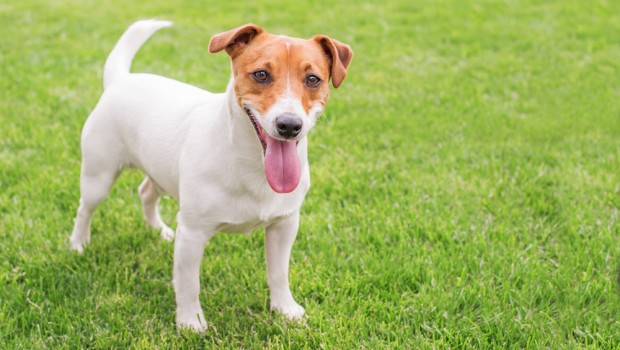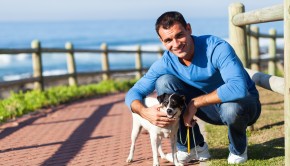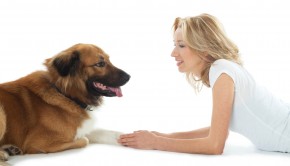Keeping Your Puppy Safe When Venturing Outdoors
Discovering the outside world is one of the most exciting and new experiences that a young puppy can have. Every little movement and sound that your puppy notices for the first time are both invigorating and scary at the same time.
The same goes for you, the owner. You want your dog to discover new things and become socialized, but are fearful that something might go wrong. Caution is the number one factor that should be taken into consideration when introducing your puppy to the outside.
Select Friendly & Healthy Canine Playmates
It is important to socialize your puppy with other animals, especially dogs, but at the same time, you must ensure that they are not the violent type and are free of diseases by way of current vaccinations.
Do not let your puppy run around with strange dogs until he has been completely immunized. The age is typically between 15 and 20 weeks before all shots are given by the veterinarian. And keep a watchful eye on these other dogs when your puppy is out playing with them.
If you and your dog are having fun in a public area specifically designated for dogs, like a dog park or someplace similar, take notice of the other animals. Are they coughing or sneezing? Do any of the other dogs appear to be going to the bathroom with diarrhea? The basic idea here is to do your best to keep your puppy away from potentially sick animals as best possible.
Keep Your Puppy Away From Strange Outside Areas
In other words, keep your puppy away from piles of rocks, tangled bushes, or wood. These areas in the wild can harbor potentially dangerous, and sometimes fatal accidents just waiting to happen. Venomous snakes and other dangerous animals, such as porcupines or skunks, could be lurking and waiting for the opportunity to strike at your little dog.
I realize that it can be a lot of fun watching your energetic, excited puppy hunting down small critters and digging up piles of dirt, but you really do not know what is underneath and it’s better to divert your dog’s attention to something else safer.
If for some reason that your puppy does run into such an accident and is bitten or injured by one of these animals, get away as fast as possible and contact your veterinarian. Should a snakebite occur or other similar type injuries that penetrate the dog’s skin, it is best to go directly to your vet. Do not wait. Some of these bites can be fatal.
Try To Avoid Any Areas Where Strange Dogs Are Allowed To Run Loose
I know how exciting it is to want to take your new puppy out to the local dog park and watch him run around, play, and meet the other dogs. However, not every dog owner has control over their pet when off-leash.
Most adult dogs are friendly to puppies, but unfortunately, some do not behave well when smaller dogs and puppies approach. This is especially true for more dominant canines that may interpret a puppy approaching as a potential threat.
Tip: Never skip out on getting your puppy his immunization shots. They can protect your dog from many communicable diseases that may be passed on from other animals. However, this is not guaranteed to protect your dog 100%, which is why it is best to avoid dog parks and other social canine areas altogether until your puppy is at least six months old and has had all of his shots.
Keep Your Puppy On His Leash At All Times
Again I must share the same excitement as you probably feel about watching your puppy run free in a large field, sprinting back and forth, tumbling over, running free and happy. There is nothing like it. And so long as your dog is in a safe, enclosed area to be off the leash, there is absolutely no problem with this activity.
On the other hand, in any other area outside, it is always best to keep him securely connected and under your control. It is totally impossible to predict any situation that you or your puppy may encounter. There are unfriendly dogs out there, cats dashing back and forth, irresponsible drivers moving at high speeds, and overly zealous children who love nothing more than to chase after small dogs to try and play with them.
Watch Out For Water Areas
Two summers ago I met my friend at a local nature park to do a little exploring for the day. He brought along his brand-new puppy to get better socialized with the outdoors. This little guy, who was a German Shepherd, by the way, was excited as can be and running around all over the place. There didn’t seem to be a single leaf or bush that this dog did not want to look into.
As we hiked along with one of the park’s trails, about 20 yards ahead of us was a big lake. My friend’s puppy darted like a rocket towards the water. Unfortunately, this young dog had no idea what a large body of water like this was like. He literally jumped in with all four paws and ended up almost drowning before we got there.
Yes, just about every dog can swim, but young puppies do need some water training so that they can adjust. My friend’s dog panicked and because of this, he was not able to keep himself afloat due to inhaling lots of water. Fortunately, we both ran and jumped in the lake just in time to keep the dog from drowning.
Dangers From Bugs
Fleas, ticks, mosquitoes, and other bugs are all very common nuisances to both humans and dogs when exploring nature. But when it comes to our little puppies, these tiny bugs can be a real bother. Take the extra time to double up on your dog’s protection against these annoying bloodsuckers.
One way to keep your puppy safe is to take advantage of several pest control products that are available on the market. These lotions and powders will help, but in addition, you can try to keep your puppy away from outside areas that may harbor ticks and other insects. For example, heavily wooded areas that are visited by deer tend to be infested with ticks. Keep your puppy or adult dog away from areas like that. Also avoid tall grass, especially dense underbrush.
Mosquito attacks can be prevented by keeping your puppy indoors early in the morning and towards the end of the daylight hours as the sun is going down. Mosquitoes are more prevalent during these times. Also keep away from moist, marshy areas and heavily wooded locations.






